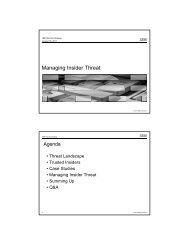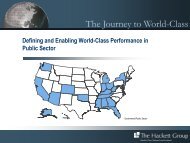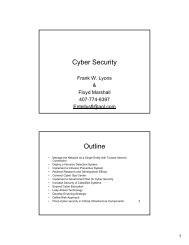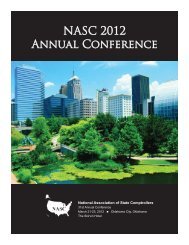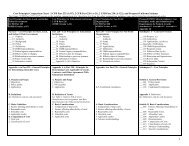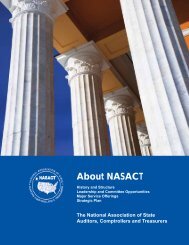Advisory Committee on Tax Exempt and Government Entities (ACT ...
Advisory Committee on Tax Exempt and Government Entities (ACT ...
Advisory Committee on Tax Exempt and Government Entities (ACT ...
You also want an ePaper? Increase the reach of your titles
YUMPU automatically turns print PDFs into web optimized ePapers that Google loves.
* You advance or pay an amount to your employeewithout regard for anticipated or incurred businessexpenses.See secti<strong>on</strong> 7 for more informati<strong>on</strong> <strong>on</strong> supplementalwages.Per diem or other fixed ailowance. You may reimburseyour employees by travel days, miles, or some otherfixed allowance. In these cases, your employee is c<strong>on</strong>sideredto have accounted to you if your reimbursement doesnot exceed rates established by the Federal <strong>Government</strong>.The 2007 st<strong>and</strong>ard mileage rate for auto expenses was48.5 cents per mile. The rate for 2008 is 50.5 cents permile. The government per diem rates for meals <strong>and</strong> lodgingin the c<strong>on</strong>tinental United States are listed in Publicati<strong>on</strong>1542, Per Diem Rates. Other than the amount of theseexpenses, your employees' business expenses must besubstantiated (for example, the business purpose of thetravel or the number of business miles driven).If the per diem or allowance paid exceeds the amountsspecified: you must report the excess amount as wages.This excess amount is subject to income tax withholdin<strong>and</strong> payment of social security, Medicare, <strong>and</strong> FUT Rtaxes. Show the amount equal to the specified amount (forexample, the n<strong>on</strong>taxable porti<strong>on</strong>) in box 12 of Form W-2using code L.Wages not paid in m<strong>on</strong>ey. If in the course of your tradeor business you pay your employees in a medium that isneither cash nor a readily negotiable instrument, such as acheck, you are said to pay them "in kind." Payments in kindmay be in the form of goods, lodging, food, clothing, orservices. Generally, the fair market value of such paymentsat the time that they are provided is subject tofederal income tax withholding <strong>and</strong> social security, Medicare,<strong>and</strong> FUTA taxes.However, n<strong>on</strong>cash payments for household work, agriculturallabor, <strong>and</strong> service not in the employer's trade orbusiness are exempt from social security, Medicare, <strong>and</strong>FUTA taxes. Withhold income tax <strong>on</strong> these payments <strong>on</strong>lyif you <strong>and</strong> the employee a ree to do so. N<strong>on</strong>etheless,n<strong>on</strong>cash payments for agricu 9tural labor, such as commoditywages, are treated as cash payments subject to employmenttaxes if the substance of the transacti<strong>on</strong> is a cashpayment.Moving expenses. Reimbursed <strong>and</strong> employer-paid qualifiedmoving expenses (those that would otherwise be deductibleby the employee) paid under an accountable planare not includible in an employee's income unless youhave knowledge that the employee deducted the expensesin a prior year. Reimbursed <strong>and</strong> employer-paidn<strong>on</strong>qualified moving expenses are includible in income<strong>and</strong> are subject to employment taxes <strong>and</strong> income taxwithholding. For more informati<strong>on</strong> <strong>on</strong> moving expenses,see Publicati<strong>on</strong> 521, Moving Expenses.Meals <strong>and</strong> lodging. The value of meals is not taxableincome <strong>and</strong> is not subject to income tax withholdin <strong>and</strong>social security, Medicare, <strong>and</strong> FUTA taxes if the mea 9s arefurnished for the employer's c<strong>on</strong>venience <strong>and</strong> <strong>on</strong> the employer'spremises. The value of lodging is not subject toincome tax withholding <strong>and</strong> social security, Medicare, <strong>and</strong>FUTA taxes if the lodging is furnished for the employer'sc<strong>on</strong>venience, <strong>on</strong> the employer's premises, <strong>and</strong> as a c<strong>on</strong>diti<strong>on</strong>of employment."For the c<strong>on</strong>venience of the employer" means that youhave a substantial business reas<strong>on</strong> for providing the meals<strong>and</strong> lodging other than to provide additi<strong>on</strong>al compensati<strong>on</strong>to the employee. For example, meals that you provide atthe place of work so that an employee is available foremergencies during his or her lunch period are generallyc<strong>on</strong>sidered to be for your c<strong>on</strong>venience.However, whether meals or lodging are provided for thec<strong>on</strong>venience of the employer depends <strong>on</strong> all of the facts<strong>and</strong> circumstances. A written statement that the meals orlodging are for your c<strong>on</strong>venience is not sufficient.50% test. If over 50% of the employees who are providedmeals <strong>on</strong> an employer's business premises receivethese meals for the c<strong>on</strong>venience of the employer, all mealsprovided <strong>on</strong> the premises are treated as furnished for thec<strong>on</strong>venience of the employer. If this 50% test is met, thevalue of the meals is excludable from income for all employees<strong>and</strong> is not subject to federal income tax withholdingor employment taxes. For more informati<strong>on</strong>, seePublicati<strong>on</strong> 15-B.Health insurance plans. If you pay the cost of an accidentor health insurance plan for your employees, includingan employee's spouse <strong>and</strong> dependents, yourpayments are not wages <strong>and</strong> are not subject to socialsecurity, Medicare, <strong>and</strong> FUTA taxes, or federal income taxwithholding. Generally, this exclusi<strong>on</strong> also applies to qualifiedl<strong>on</strong>g-term care insurance c<strong>on</strong>tracts. However, for incometax withholding, the value of health insurancebenefits must be included in the wages of S corporati<strong>on</strong>employees who own more than ~O/O of the S corporati<strong>on</strong>(2% shareholders). For social security, Medicare, <strong>and</strong>FUTA taxes, the health insurance benefits are excludedfrom the wages <strong>on</strong>ly for employees <strong>and</strong> their dependentsor for a class or classes of employees <strong>and</strong> their dependents.See Announcement 92-16 for more informati<strong>on</strong>.You can find Announcement 92-16 <strong>on</strong> page 53 of InternalRevenue Bulletin 1992-5.Health Savings Accounts <strong>and</strong> medical savings accounts.Your c<strong>on</strong>tributi<strong>on</strong>s to an employee's Health Savins Account (HSA) or medical savings account (ArcherM~A) are not subject to social security. Medicare, or FUTAtaxes, or federal income tax withholding if it is reas<strong>on</strong>ableto believe at the time of payment of the c<strong>on</strong>tributi<strong>on</strong>s thatthey will be excludable from the income of the employee.To the extent that it is not reas<strong>on</strong>able to believe that theywill be excludable, your c<strong>on</strong>tributi<strong>on</strong>s are subject to thesetaxes. Employee c<strong>on</strong>tributi<strong>on</strong>s to their HSAs or MSAsthrough a payroll deducti<strong>on</strong> plan must be included inwa es <strong>and</strong> are subject to social security, Medicare, <strong>and</strong>FU9A taxes <strong>and</strong> income tax withholding. However, HSAc<strong>on</strong>tributi<strong>on</strong>s made under a salary reducti<strong>on</strong> arrangementin a secti<strong>on</strong> 125 cafeteria plan are not wages <strong>and</strong> are notsubject to employment taxes or withholding. For moreinformati<strong>on</strong>, see the Instructi<strong>on</strong>s for Form 8889.Medical care reimbursements. Generally, medical carereimbursements paid for an employee under an employer'sself-insured medical reimbursement plan are notwages <strong>and</strong> are not subject to social security, Medicare,<strong>and</strong> FUTA taxes, or income tax withholding. See Publicati<strong>on</strong>15-8 for an excepti<strong>on</strong> for highly compensated employees.Military differential pay. Military differential paymentsare made voluntarily by an employer to make up some orall of the difference between the regular salary of anemployee called to military active duty <strong>and</strong> the amountbeing paid by the military if the regular salary was higher. Italso includes military c<strong>on</strong>tinuati<strong>on</strong> pay <strong>and</strong> active dutydifferential payments required by state statutes or paymentsmade by certain states or comm<strong>on</strong>wealths that paya stipend or a set dollar amount to their employees calledto military active duty.Military differential payments are not wages <strong>and</strong> are notsubject to social security. Medicare, or FUTA taxes or toincome tax withholding. Employers should report militarydifferential pay <strong>on</strong> Form 1099-MISC in box 3, Other income.For more informati<strong>on</strong> about the tax treatment ofmilitary differential pay, visit the IRS website at www.irs.Publicati<strong>on</strong> 15 (2008) Page 1 1






